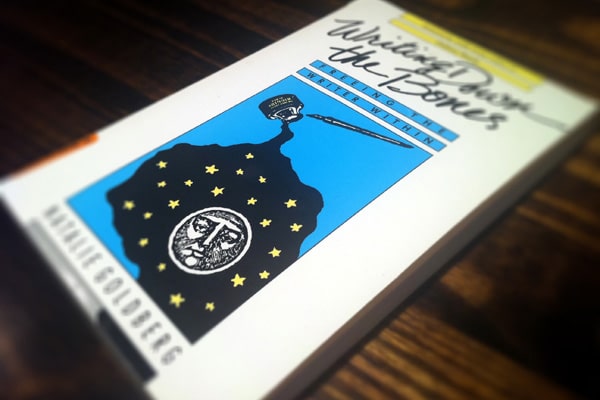|
Enjoy
Getting your Trinity Audio player ready...
|
Writing has always been a struggle for me. Not the physical part of getting my hand moving across the page but the mental barrier dragging me back to my slumber. Ideas, images and tones bring torture when the struggle to package it all together seem overwhelming. Every writing journey gets caught staring into perfection. The first draft means cutting through the dense jungle, not knowing where and how worthy the mammoth prize awaits you. In the darkest times, many writers roaming the writing landscape will feel lonely and worthless. During my leap into writing, my immense mental battles showed me writing can be a love-hate relationship. However, one year ago a special book helped me to find a greater love for writing and the unpredictable journey. Writing Down the Bones by Natalie Goldberg is a unique self-help book for all writers. She offers valuable spiritual and mental lessons, holistic ways to overcome tormenting mental demons and find confidence in writing. Too quickly do we forget writing is an art form that takes many different shapes and sizes. Writing demands patience, planning and practice. Whatever the writing task, we all writers would appreciate a push to believe in our writing and stop overthinking things. Here are some of my key takeaways from Writing Down the Bones to keep you believing and writing.

1) Forget perfectionism:
Writing is personal, an important first lesson to maintain this is to take a big gulp and swallow as much pride to ditch ideas of perfection. Many writers get crippled by perfectionism because our mind latches onto grand final ideas and images. The result does little to comfort us as more worry and planning drive us away from actual writing. Perfectionism can be so debilitating to writing, the writer may be forced to abandon all inspiration for writing.
Talking about my experience with obsessive perfectionism helps me find comfort not just in the imperfect side of human life but also in writing. As a form of work to be done and a journey for progress. I trace my toxic obsession to a fear of failing school. With every success, came more expectation to succeed and an ever-enlarging battle to prevent the looming ‘first’ failure on the horizon. The struggle to maintain an upright image, while having no faith in my success, led me to imposter syndrome. I could not free myself from success and failure. The pressure grew so large at one point I nearly crashed out of university.
Understanding this bifurcated nature to perfectionism is apparent in Goldberg’s lesson on building greater self-acceptance when writing. The desire to craft a final masterpiece is sometimes best forgotten completely. Thinking about the result is crippling and prevents people from doing the most important thing, to keep writing. As soon as one spends more than second thinking, the writing stops and in the worst case, the writing piece dies off. Remember, your first written piece never needs to be your final piece. The first dive into the wide, free ocean is there for your practice. A limitless opportunity to show and craft something new. Only after making that first dive can you chip away to reveal the gem you desired all along.
“We want honest support and encouragement. When we receive it, we don’t believe it, but we are quick to accept criticism to reinforce our deepest beliefs that, in truth, we are no good and not really writers” (Goldberg, 1986: p.58)

2) First thoughts matter:
Closely combined with Goldberg’s lesson to flee from perfection and embrace imperfection is the value of our first thoughts. As rational human beings, most of us raise ourselves in the animal kingdom by our capacity to think, contemplate and exponentially learn; to live beyond pure animal instincts. Our extraordinary ability to think and learn shines through in writing. A simple diary entry, letters, academic essays, articles and more embody a system of thoughts formulated from our experiences and surroundings. However, in trying to avoid looking or sounding like fools, we sometimes outthink our original creativity. First thoughts can be foolish, wrong or inappropriate. But they can also be avenues to access our real self. These first thoughts form glimpses to how we feel and think. Our gut feeling becomes guides to original and heartfelt writing, making it an important source of creative inspiration.
First thoughts can often be enough to get writing. They capture the buried thoughts, images and ideas within us. Goldberg eloquently expresses this through the mining analogy, helping writers to acknowledge first thoughts and note them down before our likely genuine feelings get edited out of us. With enough time, first thoughts can be the avenue of inspiration to writing an entirely new book or article.
The lesson in today’s crazy political world sounds like a disaster waiting to happen but it is simply to emphasise a source for starting the writing journey many writers struggle to find. As a methodical person, I have always gone into writing with a plan and in the process of writing obsessed with editing every sentence, I uttered. I expected perfectly sounding sentences without realising how impossible a first-time round this was. Writing is not about perfection; it is about what you communicate and how you polish your writing for the final showcase.
N.B: This may be literal torture for some people. Accepting your first sentences and thoughts is painful to see it unfold in a total mess. Refrain from going back, crossing out or editing. The editing will come later. Take a deep breath and continue writing, remember the first draft is a heuristic field where you develop the piece you intend to write. It is important to continue with this practice and not return to the toxic self-doubting writer’s mindset. With enough practice, the idealism for perfect will degrade and the writing process will become much more enjoyable and easier to embrace. This point is backed by some actual science. A book I’ve been reading on battling anxiety highlights the science behind neuroplasticity whereby it is proven our brains are malleable according to exposure to external stimuli meaning our anxious responses can also be reprogrammed with enough gradual yet brave practice.
“Besides, those voices are merely guardians and demons protecting the real treasure, the first thoughts of the mind” (Goldberg, 1986: p.17)

3) Every writing journey is different:
A blank page faces us and immediately makes us think back to that one splendid piece you remember completing. The task begins to question us, why can’t I write so fluidly, so magnificently as this last piece I managed to post or publish? The struggle to get words down and form sounding sentences induces fear and doubt, causing a stretched time crossing out a bunch of stuff and feeling like the whole day has been one step forward and two steps back. For some, the inability to see a resplendent picture compared to the writings sitting beside us causes destruction. We throw away the piece and crash out leaving writing for another ‘inspired’ day. While there is bad writing, writers must remember good writing requires time and patience. Simply getting up and writing something brief can deliver memorable writing moments. Who knows the brief encounter may form the grounds for a phenomenal story or article. Embrace the fact this is a new writing journey. Sparked by different thoughts and emotions from the finite moment you find yourself in, lighting a path to a new destination. Let it out and follow the mystical path. It will only be possible to see more clearly what lies ahead with more writing. Do not let the demons prevent you from seeing the fine glimmers, especially when letting the writing piece rest for a few days.
“Actually, every time we begin, we wonder how we ever did it before. Each time is a new journey with no maps” (Goldberg, 1986: p.5)
“So, when we write and begin with an empty page and a heart unsure, a famine of thoughts, a fear of no feeling- just begin from there, from that electricity…out of this tornado of fear will come a genuine writing voice” (p.106)
Otherwise, accept the path did not work out. Be inspired by your intuition to write and start a new writing journey. Writing flows in limitless ways which even the writer cannot determine their future.

4) Writing as a practice and learning to write freely:
Thinking about what is left to write does not bring great energy to continue writing but seeing writing as riding a long wave can. As an art form, writers need refinement which depends on continuous feedback from writers and of course, reading. This still should not mean getting obsessed with applying new nitty, gritty details as the perfectionism trap awaits. Instead, there can be a time for learning and a separate time to practice without a destination or collision of thoughts. Sometimes simply letting writing flow works because we can learn through osmosis. A finer pallet for expressing ourselves will come naturally as we engage in more reading, listening and life experiences. Listicles on the best way to write and be more productive are all helpful but sometimes a sign of procrastination from the real physical step of writing. Brush aside all expectations and create space where you can flush out all your thoughts and ideas. For instance, morning papers or fluid free writing is an extremely helpful personal time and space to flush out whatever is hanging in your head. Just writing is a helpful tool to overcome the dread of seeing a blank page and begin stirring your creative juices.
“It is odd that we never question the feasibility of a football team practicing long hours for one game, yet in writing we rarely give ourselves the space for practice.” (Goldberg, 1986: p.11)
5) Be a samurai:
Once settling with the tenderness of writing, giving your pieces some time to rest, Goldberg wonderfully expresses the need for shrewdness in the form of becoming a samurai. A samurai is a skilled, technical fighter who meticulously carves victory through the use of a sharp sword. They do not obliterate what is front of them nor fall to defeat, their fastidious movements embody discipline, patience and honour. Likewise, the writer needs to be this samurai, appreciating their skill and using fine prowess to strike at the right parts. The writing battle means there will mess, possibly lots of misses but importantly, an eventual opening. There is no point in dwelling on mistakes, writing calls for decisiveness throughout. Remind yourself, you are the samurai who holds confidence in moving past written work that does not work and waiting to carve out sentences that do in the editing stage. Consider structure, tone, rhythm, verb and vocabulary to let life flow into every sentence. The audience will appreciate it and so will you in the end. The wise samurai means being as dutiful as heroic.
“If something works, it works. If it doesn’t, quit beating an old horse. Go on writing. Something else will come up. There’s enough bad writing in the world. Write one good line, you’ll be famous.” Write a lot of lukewarm pieces, you’ll put people to sleep.” (Goldberg, 1986: p.161)

